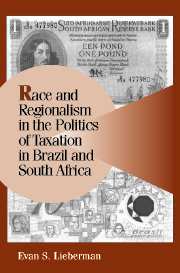Book contents
- Frontmatter
- Contents
- List of Figures and Tables
- Acknowledgments
- Abbreviations
- 1 THE POLITICS OF TAXATION
- 2 THE TAX STATE IN COMPARATIVE PERSPECTIVE
- 3 CRITICAL JUNCTURE: DEFINING NATIONAL POLITICAL COMMUNITY
- 4 THE RISE OF THE MODERN TAX STATE IN BRAZIL AND SOUTH AFRICA
- 5 SHADOWS OF THE PAST: TAX REFORM IN AN ERA OF GLOBALIZATION AND DEMOCRATIZATION
- 6 POLITICAL COMMUNITY AND TAXATION BEYOND BRAZIL AND SOUTH AFRICA
- 7 CONCLUSION
- APPENDIX: COMPARATIVE-HISTORICAL ANALYSIS
- References
- Index
- Titles in the series
3 - CRITICAL JUNCTURE: DEFINING NATIONAL POLITICAL COMMUNITY
Published online by Cambridge University Press: 22 December 2009
- Frontmatter
- Contents
- List of Figures and Tables
- Acknowledgments
- Abbreviations
- 1 THE POLITICS OF TAXATION
- 2 THE TAX STATE IN COMPARATIVE PERSPECTIVE
- 3 CRITICAL JUNCTURE: DEFINING NATIONAL POLITICAL COMMUNITY
- 4 THE RISE OF THE MODERN TAX STATE IN BRAZIL AND SOUTH AFRICA
- 5 SHADOWS OF THE PAST: TAX REFORM IN AN ERA OF GLOBALIZATION AND DEMOCRATIZATION
- 6 POLITICAL COMMUNITY AND TAXATION BEYOND BRAZIL AND SOUTH AFRICA
- 7 CONCLUSION
- APPENDIX: COMPARATIVE-HISTORICAL ANALYSIS
- References
- Index
- Titles in the series
Summary
In order to demonstrate how and why the political community model can be used to account for variance in patterns of state development, this chapter takes an historical turn, and describes the critical junctures during which definitions of National Political Community (NPC) were codified in Brazil and South Africa. To gain analytic leverage from a critical junctures framework, it is necessary show that a significant change occurred in each case, and that the changes took place in distinct ways in different cases. This implies that the initial conditions under which the two countries operated prior to the critical juncture must have been similar enough that neither the critical junctures themselves, nor the outcomes that would follow, should appear to have been pre-determined. In addition, to the extent that other periods have been widely noted as “very important” in the respective national histories, it is helpful to explain why such periods were not identified as the relevant critical juncture for the question being studied.
With respect to the cases of Brazil and South Africa, and to the political community model, this chapter demonstrates that although both societies had been divided by similar social and political cleavages in the late 19th century, different constitutional definitions of citizenship articulated around the turn of the 20th century produced contrasting patterns of inter- and intra-class relations. Subsequent chapters relate these varied political dynamics to the development of tax policy and tax administration during the century to follow.
- Type
- Chapter
- Information
- Publisher: Cambridge University PressPrint publication year: 2003



